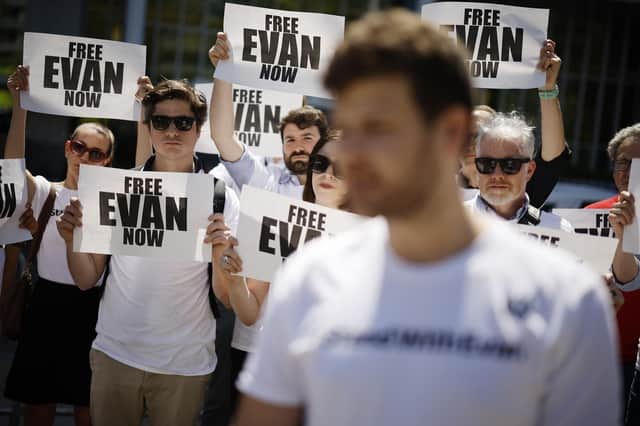'He is ready to defend press freedom': the US journalist being held in a former KGB prison


The journalist, who was arrested by Russian authorities while at a restaurant in the eastern Russian city of Yekaterinburg on 29 March, stood inside a glass box and did not attempt to speak. His appeal against his pre-trial detention at the notorious Lefortovo prison – a former KGB detention facility - where he has been held since his arrest, was quickly rejected by the Russian court.
He has been held on charges of spying in Russia, something which his employers and the US government have vehemently denied. He can legally be held in pre-trial detention until 29 May, at which time an extension period could be granted. The authorities claim he is trying to obtain classified information about a Russian arms factory.
Advertisement
Hide AdAdvertisement
Hide AdHis colleagues at the WSJ tell me that Mr Gershkovich, who was based in the newspaper’s London office, was doing stints of two weeks on, two weeks off in Russia – akin to shifts working on an oil rig. Prior to the Russian invasion of Ukraine, he had been based in Russia full time, where he had fully immersed himself in Russian life, working for English language newspaper the Moscow Times, and the Agence France-Presse before the WSJ.
His parents fled the Soviet Union due to persecution of Jews under the Communist government and Mr Gershkoich was born and brought up in the US.
One of Mr Gershkovich’s legal team, Tatyana Nozhkina, said the reporter is spending his time watching cooking programmes, exercising during the hour he is allowed to leave his cell each day and reading Russian classic novels.
“We laugh and joke a lot,” she said. “Humour helps in these situations. His mood is combative. He is ready to continue to defend his innocence…as well as press freedom.”
A strong campaign is behind Mr Gershkovich’s bid for freedom. More than 40 countries, led by the US, released a joint statement at the United Nations on Monday calling for his release and condemning Moscow for intimidating the media.
Despite the widespread international support, his lawyers, colleagues, family and supporters of his campaign awaiting his trial know history tells them that they have little hope that he is likely to be released. Most espionage cases in Russia end in a conviction, which could leave Mr Gershkovich facing up to 20 years behind bars.
He is not alone. Vladimir Kara-Murza, the Russian-British former journalist and politician, was this month sentenced to 25 years in prison, a year after being arrested on charges of disobeying police orders; "discrediting" the military and “treason”. He is one of 500 political prisoners human rights organisation Memorial has said are currently in Russian jails.
Meanwhile, in Belarus, one of the few countries allied with Russian president Vladimir Putin, more than 1,400 people still remain behind bars as political prisoners, following a period of uprising against the dictator-led government after the last general election, the results of which have been widely claimed to be questionable.
Mr Gershkovich’s case cannot be forgotten: for both his sake and for freedom of the press; not just in Russia, but around the world.
Comments
Want to join the conversation? Please or to comment on this article.
